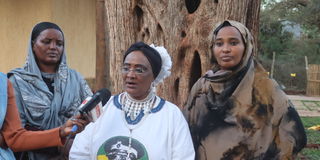Women in Marsabit push for greater role in peacebuilding, county agenda

Marsabit Human Rights Advocate Amina Aila (centre) flanked by Civic Education and Public Participation Director Orge Bajji (right) and Gender Services Director Jane Jilloh during an interview at Paradise Inn Restaurant on November 20, 2022.
Historically, most women in the strife-torn regions of northern Kenya have been marginalised, in addition to living in a traditionally patriarchal society.
Whenever interethnic conflicts erupt, women and girls bear a disproportionate burden compared with their male counterparts.
When the United Nations Security Council passed Resolution 1325 on women, peace and security in 2000, there was a glimmer of hope in northern Kenya that women would play a greater role in conflict mitigation.
But this has not happened, as women in the region are restricted to peripheral roles in peacebuilding and conflict prevention, with this blamed on the patriarchal nature of the society.
On Saturday and Sunday, women peace ambassadors who feel ‘enough was enough’ petitioned Marsabit Governor Mohamud Ali to adopt and incorporate their issues into the County Integrated Development Plan.
Speaking to journalists on behalf of the women, Ms Amina Aila explained that Marsabit women had decided not to be seen as victims anymore and will help end violence, brutality and discrimination against them.
“It is absurd that women and girls have always borne disproportionately the brunt of a series of violent conflicts witnessed in our county but they are always pushed to the periphery during the peacebuilding processes,” Ms Aila said.
If Marsabit adopts a County Action Plan on Women’s Peace and Security agenda, she said, they would be empowered to encourage grassroots feminist activism to resolve conflicts.
They also hoped that women in strife-prone zones could employ this crucial instrument to transform their lives from victims to active agents of change.
The women want the governor to prioritise the women, peace, and security agenda.
But Ms Aila said this requires the backing of the county and the national government.
She blamed lack of resources, high poverty rates, illiteracy and deeply entrenched patriarchal systems for retarding the socioeconomic development of pastoralist women.

Marsabit PLWD and Peace Ambassador Jibo Malicha displays a copy of the petition to the Governor Mohamud Ali on Women Peace and Security agenda at Paradise in Restaurant Hall on November 20, 2022.
Brenda Almasi said even the state is still ambivalent about implementing the women, peace and security agenda more than 20 years after it was adopted.
Though Kenya adopted the National Action Plan on the agenda, it has not enforced the resolution, Ms Almasi said.
The project was funded by UN Women and the Finland embassy.
Saku Accountability Forum CEO James Forole, who midwifed the drafting of the Marsabit County Action Plan and the petition, decried continuing marginalization of women in pastoralist communities.
He said that in Northern Kenya, women are marginalised in institutional politics and denied the opportunity to have a voice even in their basic human rights.
While politics in Marsabit, for example, has failed to empower women and has even marginalised them further, adopting the County Action Plan can create spaces for negotiations in other areas in the public sphere.
Integrating the County Action Plan into the CIDP will enable women’s activism to gain greater political value and legitimacy.
Marsabit County Civic Education and Public Participation Director Orge Baji expressed hope that the County Action Plan on the women, peace and security (WPS) agenda would bolster local women’s bid for a permanent role as torchbearers in peacemaking.
It will also elevate and reinforce the four pillars enshrined in the WPS agenda: protection, prevention, and participation in conflict resolutions.
It will also bolster their role in relief and recovery as spelled out among the four pillars of the agenda related to economic empowerment.
Ms Baji noted that women in the region play critical roles even in the fanning of interethnic conflicts and they need to be involved in peacebuilding.
Marsabit Tourism, Culture, and Gender Services Director Jane Jillo, for her part, pledged to use her position to ensure that the petition reached Governor Ali and was incorporated into the CIDP.
Women peace ambassadors were challenged to reach all corners of the county and enlighten other women about the WPS agenda.
“Many women have tried to intervene in the interethnic conflicts witnessed in this county, not just as mothers but as women of a community. And with this powerful tool we feel that their struggles will now bear fruit,” Ms Jillo said.





